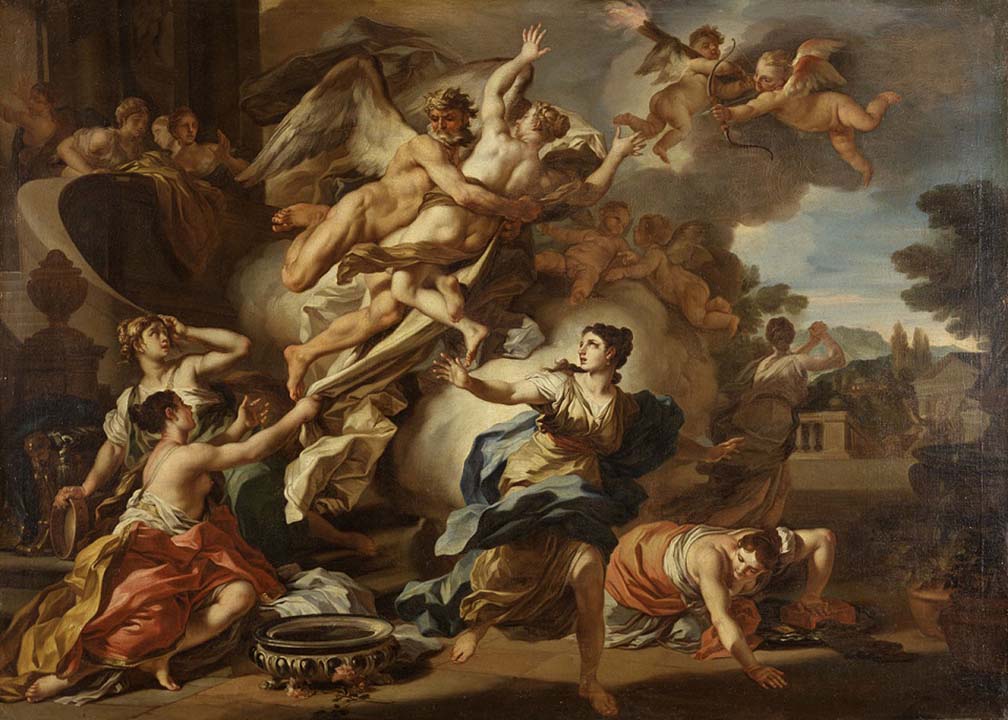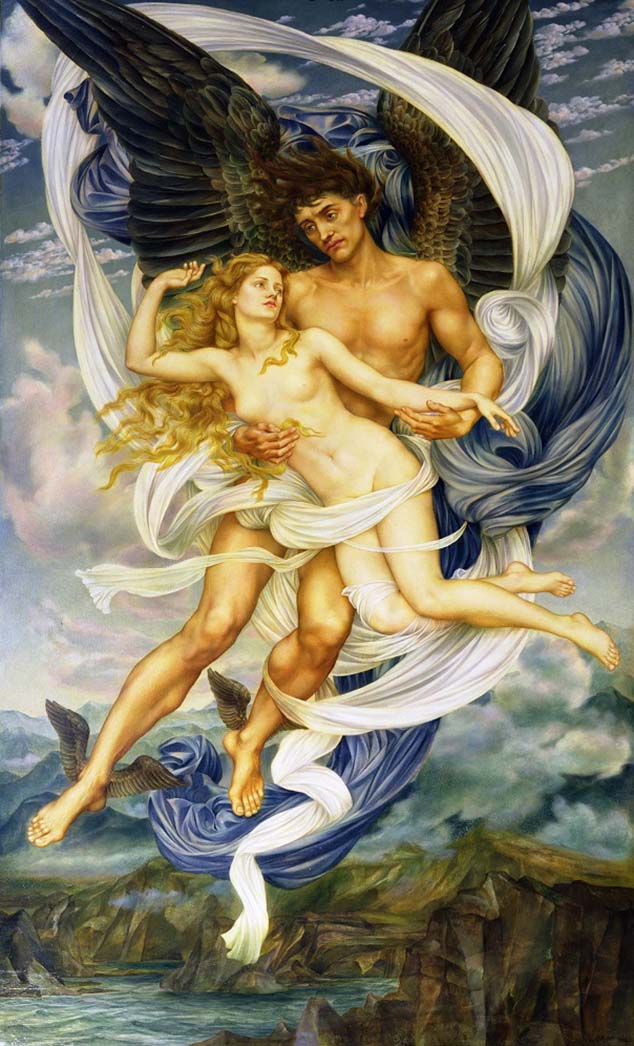Orithyia
In Greek mythology, Orithyia or Oreithyia (Ancient Greek: Ὠρείθυια) was an Athenian princess.
Family
Orithyia was the fifth daughter of King Erechtheus of Athens and his wife, Praxithea. Her brothers were Cecrops, Pandorus, and Metion, and her sisters were Protogeneia, Pandora, Procris, Creusa, and Chthonia.
Orithyia gave Boreas two daughters, Chione and Cleopatra (the wife of Phineus) and two sons, Calais and Zetes, both known as the Boreads. These sons grew wings like their father and joined the Argonauts in the quest for the golden fleece.
Mythology
Orithyia was born in Athens, and was the daughter of King Erechtheus and Queen Praxithea.
Amongst the many siblings of Orithyia were her sisters Procris, Cerusa, Chthonia and Protogeneia, and the brothers of Orithyia may have included Cecrops, Metion, Orneus and Pandorus.
Orithyia was considered to be one of the most beautiful princesses of the age, and this beauty saw her catch the eye of Boreas, the Greek god of the North Wind.
Boreas was said to have first attempted to seduce Orithyia, even going so far as to approach King Erechtheus as to ask his permission to marry his daughter. The words of Boreas did not convince Orithyia though, and as anger overtook the god, Boreas decided to abduct Orithyia instead.
The opportunity to take Orithyia occurred when the daughter of King Erechtheus strayed outside the city walls of Athens, for Boreas came across Orithyia whilst she was dancing along the bank of the River Ilissos.
Some say that Orithyia was first taken to Mount Pentelicus, north-east of Athens, whilst others tell that Boreas simply flew with Orithyia straight to the Sarpedonian Rock near the Aegean coastline of Thrace.
Upon the Sarpedonian Rock, Boreas transformed himself into a dark cloud, and enveloped Orithyia, in order that he could have sex with her.
Orithyia would subsequently become the immortal wife of Boreas, living with her husband in his palace upon Mount Haemus in Thrace. Orithyia was subsequently named as the Greek goddess of the cold mountain winds.
Nonnus of Panopolis would claim that Boreas would present Erechtheus with two immortal horses, Xanthos and Podarces, sired by the god, as recompense for the loss of the king’s daughter.
Finally, Orithyia would become mother to four children by Boreas, two daughters and two sons.
The two daughters of Orithyia were Cleopatra, who would become the first wife of the Thracian king Phineus, whilst the second daughter was Chione, a minor goddess of Snow.
The sons of Orithyia were Zetes and Calais, brother collectively known as the Boreads, who would become famous for their role as Argonauts.
Legends
Plato writes somewhat mockingly that there may have been a rational explanation for her story. She may have been killed on the rocks of the river when a gust of northern wind came, and so she was said to have been 'taken by Boreas'. He also mentions in another account she was taken by Boreas not along the Ilissos, but from the Areopagus, a rock outcropping near the Acropolis where murderers were tried. However, many scholars regard this as a later gloss.
Plato also mentions that Orithyia was playing with a companion nymph Pharmacea.
Because she was in Thrace with Boreas, she did not die when her sisters either committed suicide or were sacrificed so that Athens could win a war against Eleusis.
Orithyia was later made into the goddess of cold mountain winds. It is said that prior to the destruction of a large number of barbarian ships due to weather during the Persian War, the Athenians offered sacrifices to Boreas and Oreithyia, praying for their assistance.
Orithyia in Greek Mythology
In Greek mythology, Orithyia or Oreithyia was the name of the following women:
Orithyia, one of the Nereids.
Orithyia, a daughter of Cecrops, wife of Makednos and mother of Europus.
Orithyia, a daughter of Erechtheus.
Orithyia, a nymph, called by some the grandmother of Adonis.
Orithyia (Amazon), queen of the Amazons

Sources
Apollodorus, Bibliotheca 3.15.1.
Suda s.v. Maidens, Virgins (Παρθένοι)
Pindar. Pythian Odes, 4.8.
Ovid. Metamorphoses, VI.683.
Bibliotheca, 3.15.2
Apollonius of Rhodes. Argonautica, 1.212.
Plato. Phaedrus, 229.
See Fowler's translation of Phaedrus 229d.
Phaedrus 229c.
Herodotus. Histories, 7.189.
"Wikipedia"
"Greek Legends and Myths"













